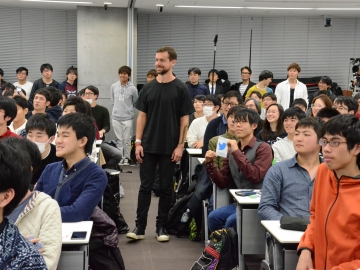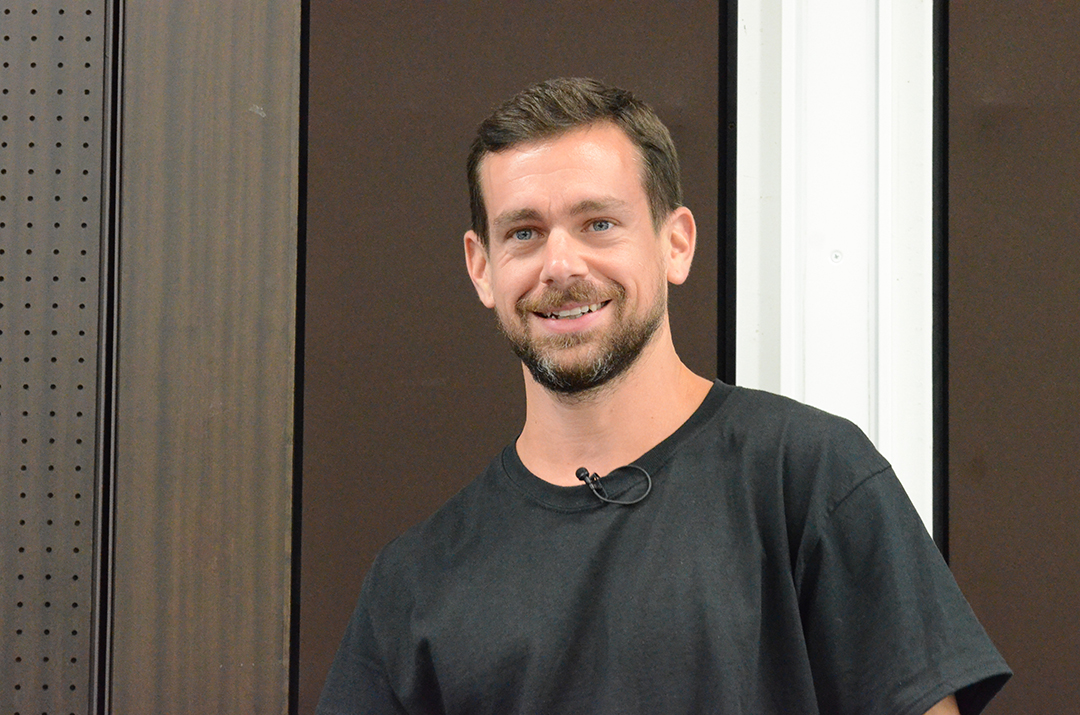Secret behind Twitter’s success? “Start small,” says CEO Jack Dorsey
Tue, Nov 28, 2017-
Tags
@jack @waseda_univ in Tokyo
“Japan has always been an inspiration for our company and to me personally,” said Jack Dorsey, Co-founder and CEO of Twitter. “One of my favorite design aesthetics is wabi sabi, which I learned a lot from and try to use it in all my work.”

Jack Dorsey, Co-Founder and CEO of Twitter
He spoke to a crowd of over 300 science and engineering students at the Nishiwaseda Campus, Waseda University on November 13 about how the online news and social media service was started, and gave advice to the future internet entrepreneurs in the room. This talk was organized by the Faculty of Science and Engineering, the Graduate Program for Embodiment Informatics, and the Top Global University Project’s ICT and Robotics Unit.
Dorsey visited Waseda to meet students and hear new ideas and questions. “The more time I get to spend listening to questions and listening to people talk about how they use Twitter, the better it gets.”
Furthermore, Japan is Twitter’s second largest market after the United States and has been an important part of its development. The company has watched and studied the behavior of Japanese users for over 10 years. “One of the things we noticed early on was that Japanese people were using application programming interface (API) to put bots on the service, and the first bot we saw was a Tamagocchi. It was unexpected but a great case that we saw more and more all over the world.”
New social interactions with @ and #, created by users

More than 300 science and engineering students attended the talk
Currently with over 300 million users worldwide, Dorsey’s path for Twitter came out of a desire to broadcast and see what was happening in the world. “I had been working on software for dispatchers, and one thing I loved about that was being able to see them go around the city and see what was going on.” When he and his co-founders, Biz Stone and Noah Glass, first made Twitter, they intended to share what was happening with them and what they were seeing, but as it started growing, they noticed that people were interested in communicating with each other. Twitter users started using the “at (@)” symbol with a name to direct their messages to a particular person and the “hash (#)” symbol in front of a word to label their messages.
“When we saw this, we programmed Twitter so that users could reply to each other’s messages and link particular words to a search. Suddenly, people could tag tweets, and out of that behavior, people would organize themselves around topics and interests. @ and # then jumped off our platform into billboards, TV and other services. The people that were using Twitter actually created these social interactions that we never designed, fundamentally changing our entire service. So, what has made Twitter what it is today was just actually watching how people were using it and making it easier for them to use.”
Start with something small

Dorsey taking a photo with the audience
When asked how Japanese students could create services on a global scale like Twitter, Dorsey said to not get scared off by making the problem too big and receive as many feedbacks. “If you start with trying to figure something out that will be global right away, you will not be able to get very far. Start with something very small that you want to use, and build enough that you want to show your friends. That was how we started Twitter. Also, the more you keep your idea in your head, the less you will be able to do and the less impact you will have.”
Lastly, Dorsey shared his enthusiasm for the aspiring engineers in the audience. “I am really excited for you. You get to work with technologies I did not have access to, and explore solving problems that we were just not able to in the past. With AI, machine learning and deep learning, it’s an entirely new world.” He left the students with this piece of advice: “Continue to be very curious, constantly ask why, and learn as quickly and as much as you can.”
Q&A Session
After the talk, Dorsey answered questions from the audience, which some are listed below.

Q. You are one of the most successful entrepreneurs in the world. Why do you keep a low profile?
I like keeping a low profile and would not have it any other way. It is important to put the focus back on people using our service. What has been special to me about Twitter is what people have done with it, and how they have changed and inspired it. Although the folks within our company are amazing too, the focus needs to be on how people are using it and how we can serve our users better every single day.
Q. What kind of things are you doing to increase Twitter users?
The biggest thing we are doing is to make it a whole lot easier for people to find what they are interested in. Also, we believe that if we focus on the people that are using Twitter today and make it better for them, they are going to talk about it more with their friends, families, colleagues, and classmates. That is going to be far more effective than any marketing that we can do.
Q. I don’t use Twitter because I don’t want to be using my smartphone all the time. How do you plan on getting people like me to use Twitter?
One of the things we want to do is make sure that you do not have to be present on Twitter all the time to get value out of it. If we can be one of the first places you check when you wake up because you want to know what is going on in the world, it should be very fast for you to get in and then get out. Right now, that is not the case. So, we have a bunch of work to do so that you do not have to check your phone all the time. It just notifies you with a little bird that goes up your shoulder, tells you what is important and then flies away. That is work on us, and we will work on it (Dorsey smiling) if you promise to try and sign up.
Q. Twitter is banned in certain countries, for example, China. Do you plan to negotiate with those countries so that the people there could use Twitter?
We would love to see Twitter be used by everyone in the world and be unblocked in China. In the past, we have tried talking with the government, but there has been no budging. We will not compromise on our principles, so unfortunately, we remain at stalemate. However, we are completely open to working with such countries but in a way that the rest of the world has access to Twitter.
Q. What are your personal strengths and weaknesses?
I will start with my strength, which is having a lot of resilience and patience. I am also very calm under pressure. My weakness was being very shy as a kid. I had a speech impediment, and no one could understand me. I went to a speech therapist for a long time to correct it. So 30 years ago, I would not be able to stand in front you, talking with a microphone or giving any speeches, even in front of a team because I was way too shy to do that. What I did was to force myself to change that by joining the speech club and debate club, and then just pushing myself every single day to get out there and do it. I still get nervous about things like this, but I know it is necessary for me to build what I believe Twitter needs to be and build the company. Any weakness I find, I try to improve if it is important to do what I need to do in my life.
Q. What is the most important thing in life?
The most important thing in life is being able to learn something new and challenge myself every single day. We have a culture that naturally focuses the first part of our lives on learning. Then, you stop because you are out of school and no longer studying. However, wanting to improve and really push myself has made me a lot better and has had the biggest impact in my life.














